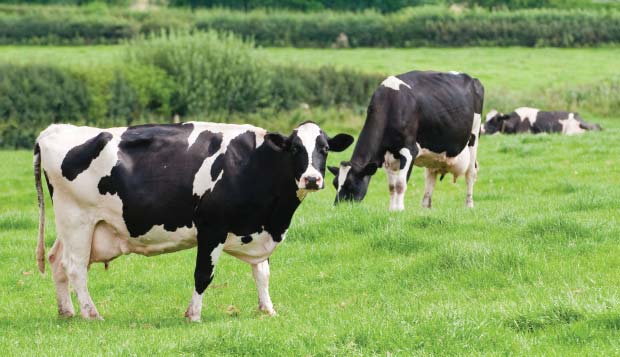Cattle health program helps herds and humans
 Herds of grazing cattle set the classic backdrop of any drive through the Empire State. New York means cows, and not just because of the scenery. Dairy farms feed millions, providing the number one agricultural industry in the state, which ranks third in the US for milk production. The economy, natural resources, and public health of the state depend on healthy cattle. For that reason, New York State has developed a program to ensure the health, productivity, and stewardship of cattle and the farms they inhabit.
Herds of grazing cattle set the classic backdrop of any drive through the Empire State. New York means cows, and not just because of the scenery. Dairy farms feed millions, providing the number one agricultural industry in the state, which ranks third in the US for milk production. The economy, natural resources, and public health of the state depend on healthy cattle. For that reason, New York State has developed a program to ensure the health, productivity, and stewardship of cattle and the farms they inhabit.
The New York State Cattle Health Assurance Program (NYSCHAP) provides a free service to any interested dairy or beef farm in the region. Funded through the state’s Department of Agriculture and Markets, the program offers collaborative consultations with state or certified veterinarians specially trained to work with farmers and their herd veterinarians to increase herd health, productivity, and profitability.
NYSCHAP works to assure food safety, public health, and consumer confidence in beef and dairy products that are sold in markets across the state and deck countless family tables. The program also supports the region’s natural resources by promoting environmental stewardship and best practices for waste management.
 “Many issues face modern dairy and beef farmers, from maintaining a herd and managing disease to ensuring profitability and product quality,” says Kathy Finnerty, who directs the program from her office in the AHDC. “When a farm enrolls in NYSCHAP, we form a team of advisors to develop a plan for the herd based on the goals and resources of the farm.”
“Many issues face modern dairy and beef farmers, from maintaining a herd and managing disease to ensuring profitability and product quality,” says Kathy Finnerty, who directs the program from her office in the AHDC. “When a farm enrolls in NYSCHAP, we form a team of advisors to develop a plan for the herd based on the goals and resources of the farm.”
A NYSCHAP farm team consists of a state field veterinarian or certified NYSCHAP veterinarian, the farm’s owner, the herd’s veterinarian, key farm employees, and other consultants used on the farm. After reviewing basic information and conducting a walk-through risk-assessment, the team forms a herd plan, including a prioritized list of best management practices specifically tailored to the farm.
“Goals may include anything from increasing milk production and quality, to expanding the herd, to controlling disease,” Finnerty explains. “The farm’s staff and herd veterinarian work together over the year to meet the agreed-upon goals, using the herd plan as a guide. Collaboration is key, and every member’s input counts in forming and implementing the plan.”
“It’s free, voluntary, and confidential,” Finnerty adds. “The state pays for visits from both a state field veterinarian and the farm’s own herd veterinarian. The veterinary visits, the team consultations, and the herd plan they produce can all have a great impact on the health and success of a farm. That translates to the health of consumers and the success of the state itself.”
Extension veterinarians from the College’s Diagnostic Lab helped get the program off the ground in 1998. Today faculty from the AHDC continue to assist in the program’s development and implementation, train veterinarians on pertinent topics, and meet herd veterinarians to discuss the use of new testing capabilities as these new tests become available. Participating farms receive significant discounts on certain tests at the AHDC, including Johne’s disease testing and bulk tank culture testing for contagious mastitis, an infection of the udder.
All farms enroll in the core module, which addresses biosecurity, food quality assurance, environmental stewardship, management of manure, feed, water, and facilities, and the possible introduction and spread of disease. Farms may also enroll in individual modules tailored to specific diseases, including Johne’s disease, bovine viral diarrhea (BVD), salmonella, bovine leukosis, mastisis and milk quality, and environmental pathogens. Other modules specifically address beef quality, herd expansion, and cattle welfare certification.
Currently 870 farms throughout New York State participate, including 60-70 beef farms, and 35% of all dairy cattle farms in the state. Farmers interested in enrolling in NYSCHAP can contact their herd veterinarians, or go online for more information at http://nyschap.vet.cornell.edu/.
NYSCHAP utilizes 11 NYS Department of Agriculture and Markets field veterinarians, and offers a training program for private practitioners. Veterinarians interested in becoming certified complete a training class or submit a certification test. Contact Kathy Finnerty, NYSCHAP Coordinator, at kdf2@cornell.edu for more information.